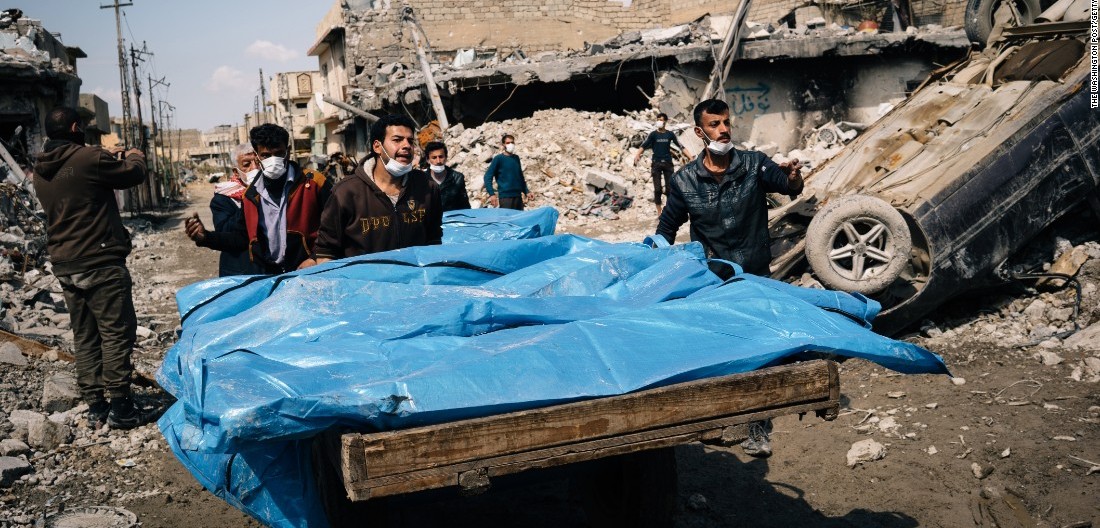“Beyond the competing narratives and the political laying of blame, one fact remains: innocents in Iraq will always pay the heaviest price.”
As the US military finally admits that it “probably had a role” in the bombing that likely killed more than 200 people in Iraq’s second city of Mosul on March 17, Balsam Mustafa reviews the incident and its significance:
Hundreds of people were killed in the airstrike in the al-Jadida neighborhood in old Mosul on the western side of tghe city, amid fighting between Iraqi forces and the Islamic State. The attack was on Friday, March 17, but it did not receive attention by international and Arab media until a week later, just after the Pentagon admitted the airstrike had occurred and said it was investigating.
The majority of media reports on the airstrike quoted the local Kurdish media source, Rudaw. But Rudaw was not the first outlet to report on the incident — early accounts came from social media, particularly from Mosul Eye, and from some Iraqi activists and journalists.
When the deaths finally drew attention, narratives about the incident clashed. The Pentagon finally admitted that its air force carried out the strikes, at the request of Iraqi forces. However, it said the primary cause was the detonation of explosive on an Islamic State truck, collapsing a nearby building. Statements by Iraqi military officials seemed to confirm this.
Local accounts, on the other hand, spoke of ISIS snipers on top of buildings where hundreds of families were seeking shelters in basements. Others said that the Islamic State forced civilians to gather in those basements, using them as human-shields.
Mosul Eye, an account by an Iraqi resident documenting life in the city under the Islamic State, confirmed the latter narrative. It warned of more casualties if military tactics are not changed to account for the unique architecture of the old city, with its very narrow streets and dense population. Other Iraqi journalists and activists agreed: while the defeat of ISIS is desperately desired, they said it should not be at the expense of the lives of both civilians and ground forces from bombing. For what it is worth, these witnesses have also been quicker than other actors to send aid to refugees fleeing Mosul before and after the airstrike.
The toll of victims also varied. The Iraqi Government spoke of 130, while local sources reported 200. Some media sources claimed that the number of victims was much higher, exceeding 500.
Political and sectarian frames quickly surrounded the incident and its narratives. Some Sunni politicians directly blamed Iraqi Prime Minister Haider al-Abadi, as they called for suspending the military operations. On social media, some accused the mainly-Shia Popular Mobilization Units of being responsible.
The latest airstrike is far from the first since the start of the military campaign in and beyond Mosul. An attack in eastern Mosul in January killed a well-known professor and his family. In Syria, where Russia has killed thousands of civilians, an escalation in US raids has addded more deaths, including 56 people in a mosque in western Aleppo Province in mid-March. And in Yemen, often overlooked by the media, about 10,000 civilians have been killed in the civil war, many of them by the bombing of the Saudi-led coalition.
Beyond the competing narratives and the political laying of blame, one fact remains: innocents in Iraq will always pay the heaviest price. The dead in Mosul join those in Karrada, al-Sadr city, Ramadi, Falluja, and Hilla. They follow the victims of the Speicher massacre, the Yezidis, Christians, Shabak, Turkmen, Kurds, and others killed, executed, and displaced by the Islamic State.
The world has called for protection of civilians from attack after high-profile terrorism in Paris, Brussels, Orlando, and London. Will it do so for those in Mosul and the rest of Iraq?
Local volunteers carry the bodies of civilians found in the rubble of a building in the al-Jiddah district after the US bombing on March 17, 2017

